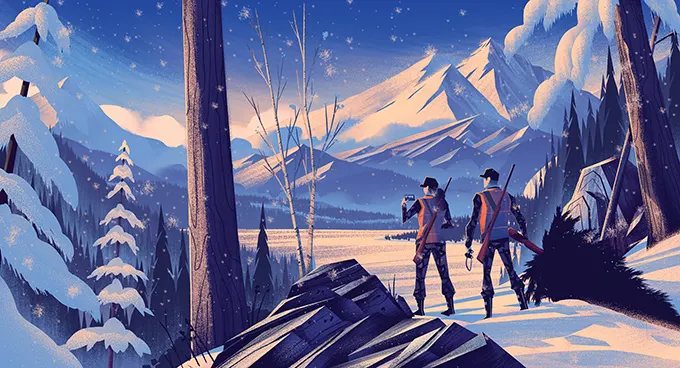To celebrate Father’s Day, all week long we’ll be publishing a series of stories all about dads—about their companionship in the outdoors, about them teaching or encouraging us to hunt and fish, and about how we wouldn’t be where we are, or who we are, without them. Fittingly, we’re calling this series “Thanks, Dad.”
Do you have a great story to share about your dad? Submit it to our Father’s Day Contest for a chance to be featured in the F&S journal and win a prize package valued at $500.
It was like a bad gas-station postcard. While Lowry slept in a patch of sun on a high ridge, exhausted from the rigors of excruciating airport delays on her Thanksgiving journey home from Madison, strep-throated and finals-fatigued, but glad, so glad, to finally be back home in Montana—while she lay in the snow on her back, the mild sun almost warm upon us, and slept, with her rifle leaning safely against a log and a half-gallon jug of brilliant orange juice chilling in the snow beside her—two elk had come pussyfooting down the ridge behind us, scented us, and then detoured quietly, unpanicked, as if our sprawling little impromptu naptime spot was but a newly erected roundabout.
Once the elk were past us, they continued down the ridge, headed to wherever they were going.
We did not find any of this out until later, post-nap, when we arose and started back down the long ridge we had ascended earlier that morning, back when the snow had still been frozen in the darkness, concussive, the night’s last stars fading, the jagged, snowy Pintlers beginning to glow in the distance. Lowry—who had been homesick without maybe quite knowing she’d been homesick, in that curious way that happens when you like the new place where you are, but also miss the old one, home—had kept stopping to take pictures of the rising sun illuminating those mountains. As if in those three short months in Wisconsin she had started to forget the mountains.
One never forgets. But it was the longest she had ever been away from them, and she kept stopping to photograph them as if they themselves were wild animals that might somehow begin moving away from her, or seek in some other manner to elude her.
At the top, once the sun was upon the snow and melting the cast of it, softening it and making it glow and glisten, we had bedded down and rested. The scent of ceanothus, of lodgepole. We were thinking, Maybe deer. I did not think we were high enough or far enough back—only an hour or so in—for elk. She napped, and I sat there and watched, and sometimes thought about nothing at all, though other times I would look over at her, and out at the sunstruck snowy mountains, and think, Wow, we’re hunting. Her first hunt.
She awakened after half an hour or so. We were due home that night, five hours north. It wasn’t a real hunt; we were just kind of easing into it. Just out for a walk. We started back down the ridge, and that’s when we found those new tracks, new and bright in the warming slush. We followed them quietly into the wind.
We followed the tracks for an hour, down into the lower places where the snow went away. We found wolverine tracks from what looked like the day before. Was the wolverine moving the elk around and around on this mountain? It seemed busy, even crowded, yet we saw nothing. But we were hunting. We were into the elk and might get up on them at any moment, except for the fact that they had gotten the drop on us during naptime, and knew we were on the mountain. We played it out, followed them down into the cool shade, trying to parse their tracks in the damp earth, then lost them in the dead winter grass on a south slope. I suspect they made a big circle, always moving, this late in the season, casting a ceaseless net throughout their watershed, trolling for all scent, all predators, always.
At the bottom of the ridge we cut the most beautiful and fragrant little Christmas tree ever, a Douglas fir, and hiked on out, back to the car, tied it to the top, and drove on home. One hunt down, and ten thousand more to go.

